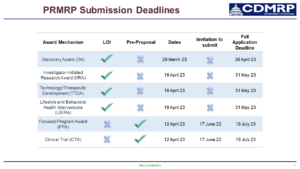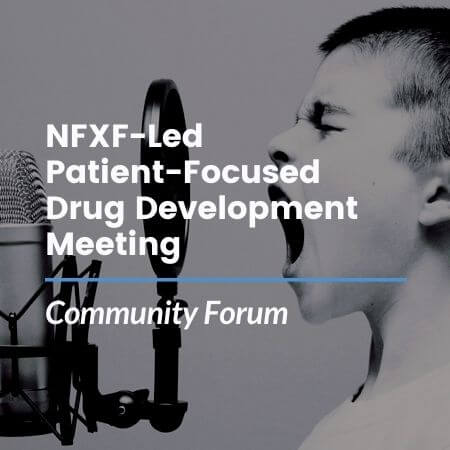Dr. Kathryn Argue Shares Information and Tips for Applying for DOD’s PRMRP Funding
The NFXF hosted a webinar featuring Dr. Kathryn Argue, Deputy Program Manager of the Peer Reviewed Medical Research Program. Dr. Argue reviewed the details of the Congressionally Directed Medical Research Program, specifically the Peer-Reviewed Medical Research Program (PRMRP). Thanks to the efforts of the NFXF advocates, Fragile X, which includes all FMR1-associated conditions and disorders (FXS, FXTAS, FXPOI, Fragile X Premutation), is once again included as an eligible topic area for Fiscal Year 24 (FY24).
Dr. Argue shared programmatic details, deadlines, and tips to support researchers throughout the application process, and answered questions from attendees.
Align your proposal with the program-specific goals.
Review the FY24 PRMRP Synopsis of Award Mechanisms Table
- Fragile X sits in the Rare Diseases and Conditions Portfolio
- Review the specific Strategic Goals for FY 24. Applications must address one Strategic Goal and one Topic Area.
- More information can be found here: Research Funding Opportunity from CDMRP/PRMRP for Fiscal Year 24 | NFXF (fragilex.org)
A few top tips from Dr. Argue include:
- Read the funding opportunity announcement carefully.
- Address Military Relevance and Impact in your application.
- Most funding opportunities require a Letter of Intent (LOI) and may continue to complete the full application. An invitation is not required.
- Only those who apply for a Clinical Trial Award must submit a Prepropsal and await an invitation to complete the full application.
- Be aware of the award-specific deadlines and submit on time—there are no exceptions.
- Applicants who conduct research at institutions around the world are eligible to submit an application.
- Sign up for the listserve through the CDMRP website or eBRAP.
- Review the CDMRP Webinar Series on types of funding opportunities and strategies to increase the success of the application: Webinar Series, Congressionally Directed Medical Research Program (health.mil)

Watch a recording of the webinar and view Dr. Argue’s slides below.
We are grateful for partners like the PRMRP who fund Fragile X research. Thank you, Dr. Argue, for taking the time to educate us about this valuable funding opportunity. If you have questions about the PRMRP, please email help@ebrap.org.
The NFXF is also here to help! If you would like to participate in the NFXF’s Research Readiness Program, consult with our Family Advisory Commitee, or partner in another way, please reach out to anna@fragilex.org.
about

Missy Zolecki
Missy joined NFXF team in 2018 after being an active volunteer since 2010. Missy organized several fundraisers and educational workshops while serving in her volunteer role. Missy is the mother of three children. Her eldest son, Matt, lives with Fragile X syndrome. Prior to joining the NFXF team, Missy had worked as a nurse for more than 20 years. She enjoys traveling and spending time with family and friends.
learn more
How Clinical Trials Work: From Start to Finish
A guide to better understanding of clinical trials, including how they work and how to become a participant.
PFDD Meeting Community Forum
The Patient-Focused Drug Development (PFDD) meeting on Fragile X syndrome is just around the corner! We need caregivers and self-advocates to participate to make this a valuable meeting. This will help you understand what to expect and what the goal is and how to share your story.



